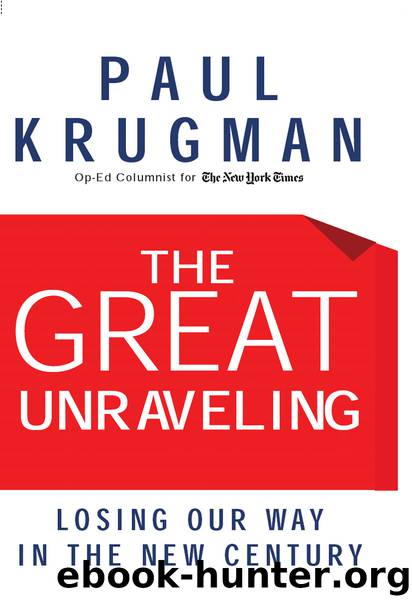The Great Unraveling by Paul Krugman

Author:Paul Krugman
Language: eng
Format: epub, mobi
Publisher: W. W. Norton & Company
Published: 2003-04-29T16:00:00+00:00
PRESCRIPTION FOR FAILURE
July 26, 2000
In denouncing President Clinton’s plan to extend Medicare coverage to prescription drugs, and in touting their own counterproposal, Republicans have rolled out the usual rhetoric. They excoriate the administration plan as a bureaucratic, “one size fits all” solution. They claim that their plan offers more choice.
And for once their claims are absolutely right. The Republican plan does offer more choice.
Unfortunately, this is one of those cases in which more choice is actually bad for everyone. In fact, by trying to give people more choices the Republican plan would end up denying them any choice at all.
Where Democrats want to offer drug coverage directly to Medicare recipients, the Republicans propose to offer money to private insurance companies instead, to entice them into serving the senior market. But all indications are that this plan is a non-starter. Insurance companies themselves are very skeptical; there haven’t been many cases in which an industry’s own lobbyists tell Congress that they don’t want a subsidy, but this is one of them. And an attempt by Nevada to put a similar plan into effect has been a complete dud—not a single insurer licensed to operate in the state has shown any interest in offering coverage.
The reason is “adverse selection”—a problem that afflicts many markets, but insurance markets in particular. Basically, adverse selection is the reason you shouldn’t buy insurance from companies that say “no medical exam necessary”: when insurance is sold to good and bad prospects at the same price, the bad risks drive out the good.
Why can’t the elderly buy prescription drug insurance? Suppose an insurance company were to offer a prescription drug plan, with premiums high enough to cover the cost of insuring an average Medicare recipient. It turns out that annual spending on prescription drugs varies hugely among retirees—depending on whether they have chronic conditions, and which ones. Healthy retirees, who know that their bills won’t be that high, would be unwilling to buy insurance that costs enough to cover the bills of the average senior—which means that the insurance plan would attract only those with above-average bills, meaning higher premiums, driving still more healthy people away, and so on until nobody is left. Insurance companies understand this logic very well—and are therefore simply not interested in getting into the market in the first place.
The root of the problem is that private drug insurance could be offered at a reasonable price only if people had to commit to paying the necessary premiums before they knew whether they would need expensive drugs. Such policies cannot be offered if those who find out later that they don’t require such drugs can choose to stop paying what turn out to be unnecessarily high premiums.
And while in principle one could write a contract that denies the insured the choice of opting out, just try to imagine the legal complications if a private company tried to force a healthy retiree to keep paying high premiums for decades on end, even though he turns out not to need the company’s benefits.
Download
This site does not store any files on its server. We only index and link to content provided by other sites. Please contact the content providers to delete copyright contents if any and email us, we'll remove relevant links or contents immediately.
The Secret History by Donna Tartt(19097)
The Social Justice Warrior Handbook by Lisa De Pasquale(12193)
Thirteen Reasons Why by Jay Asher(8915)
This Is How You Lose Her by Junot Diaz(6891)
Weapons of Math Destruction by Cathy O'Neil(6283)
Zero to One by Peter Thiel(5805)
Beartown by Fredrik Backman(5763)
The Myth of the Strong Leader by Archie Brown(5511)
The Fire Next Time by James Baldwin(5452)
How Democracies Die by Steven Levitsky & Daniel Ziblatt(5221)
Promise Me, Dad by Joe Biden(5155)
Stone's Rules by Roger Stone(5089)
A Higher Loyalty: Truth, Lies, and Leadership by James Comey(4965)
100 Deadly Skills by Clint Emerson(4929)
Rise and Kill First by Ronen Bergman(4792)
Secrecy World by Jake Bernstein(4755)
The David Icke Guide to the Global Conspiracy (and how to end it) by David Icke(4721)
The Farm by Tom Rob Smith(4516)
The Doomsday Machine by Daniel Ellsberg(4492)
